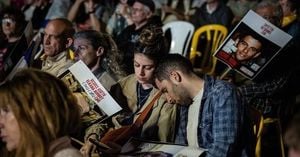Navigated through the whirlwind of pop culture, one can't help but notice the recent surge of celebrity look alike contests taking the globe by storm. Spanning from the iconic streets of New York to lively neighborhoods of Nashville, these entertaining events not only invite fans to showcase their resemblance to luminaries but also stir up discussions about identity, community, and the quest for belonging.
Whether it’s Timothy Chalamet, Zayn Malik, or the late Heath Ledger, these competitions have become compelling platforms for everyday folks to revel in the limelight—albeit for just a fleeting moment. These events are less about trophies and more about shared experiences and laughter, creating temporary third spaces for people to connect beyond the digital world.
The excitement kicked off with the eye-catching Timothy Chalamet look-alike competition held on October 27th, 2024, in New York City. Spearheaded by YouTuber Anthony Po, who plastered fliers across the city, the event rapidly blew up on social media, and before long, it attracted about 10,000 eager attendees, all of them hoping to capture the essence of the popular actor. To top it off, Chalamet himself made an unexpected appearance, cementing the event as one for the history books.
"We want other people to have their moment. If it traces back to me that's great," Po said, highlighting how the vibrant community he created was meant for shared enjoyment. Although attendees faced police involvement and some unfortunate arrests during the chaos, the sense of camaraderie overshadowed all.
But what’s behind this phenomenon? Is it just fun and games? The trend can be traced back to the shifting cultural landscapes where traditional 'third places'—like cafes, bars, or community centers—are becoming less accessible or increasingly expensive. Sociologist Ray Oldenburg emphasized the importance of these spaces for community interaction, pointing out their necessity for human connection. Sadly, with rising living costs, fewer people can enjoy the simple pleasure of sharing time with friends over coffee or drinks.
Enter look-alike contests—a free, community-driven alternative. These competitions eliminate financial barriers, offering participants the chance to simply show up and join the fun. For many, it’s not only about the silly glory of winning; it’s about experiencing joy alongside fellow fans and reveling in shared interests. One example is the upcoming Twilight-themed competition scheduled to take place at Centennial Park, organized by the Twilight Society of Middle Tennessee. Katherine Kimbrough, the society's founder, hopes to create more than just laughs; she aspires to forge new friendships among fans, reminiscent of her own youthful, awkward love for the series.
Fans of the fantasy series are expected to turn out en masse, showcasing their best Edward, Jacob, and Bella impersonations. Kimbrough reminisced, "I hope the contestants just have fun and show off how they look like Edward, Jacob or Charlie, especially if they're someone who gets 'Do you know who you look like?' all the time." Such events present opportunities for bonding, creating spaces for those who grew up as shy fans to thrive.
The trend continues to spread rapidly across various cities, encompassing Dublin, San Francisco, London, and beyond, with more competitions popping up seemingly daily. Meanwhile, prizes may lean on the meager side, like $50 cash or promises of cheesy medals, attendees seem unbothered. Instead, they embrace the fun of dressing up and stepping out for the pure joy of shared fandom.
Why is it so captivating? For many, the answer lies not simply with the appeal of celebrity culture—it’s also about participation and community interaction. Events tend to bring together like-minded individuals who share the same exuberance for pop culture, making it easier to strike up conversations, forging new connections and friendships on the spot. The casual nature of look-alike contests opens paths for anyone to get involved, regardless of background or skill.
Yet, amid the merriment, there's also concern around the gender imbalance prevalent within this space. Most look-alike competitions have been focused predominantly on male celebrities, with only a handful honoring female icons. Josie Copson, reflecting on her experiences, pointed out, “Out of the 15 different contests since October 27th, only two have centered on women.” She highlighted how it seems like women are yet again erased from the fun. There’s hope, though; she urges for more contests celebrated around female figures, providing equal platform and opportunity.
The cultural impact of these contests continues to ripple across social media platforms, with participants and fans alike sharing their experiences and highlights online. TikTok, especially, has become the stage where countless videos capture the spirit of these events. It’s not just a mere trend; it’s become part of the fabric of fan culture, enriching moments of nostalgia and excitement.
Among the standout impersonators is Miles Mitchell, who claimed victory during the Timothée Chalamet contest dressed uniquely as the actor’s character from "Wonka." Sharing his joy, Mitchell declared, "This is probably the biggest day of my life!" Such sentiments echo across the competitions, showcasing the thrill of stepping onto the platform, even if just for the thrill of holding the spotlight, albeit for just a fleeting moment.
These look-alike contests are undeniably entertaining but also serve as mirrors to our society's changing landscapes. They reflect our yearning for community connection amid increasing isolation born from today’s digital age. Sharing camaraderie through celebrity resemblance presents not just temporary joy but taps deep emotional tapestries, fostering unity and shared laughter.
Indeed, as trends swirl globally, it’s clear: celebrity look-alike contests are not merely amusing spectacles—they are rejuvenators of community spirit. Engaging, lighthearted, and utterly relatable, these gatherings offer stepping stones to navigate through the often overwhelming landscapes of modern life.
So, whether perfectly mimicking your favorite star or just having fun with friends, the essence of these contests lies within their simplicity—they remind us to embrace joy wherever we find it. Who knows? You might just stumble upon your next best friend among the doppelgängers.



